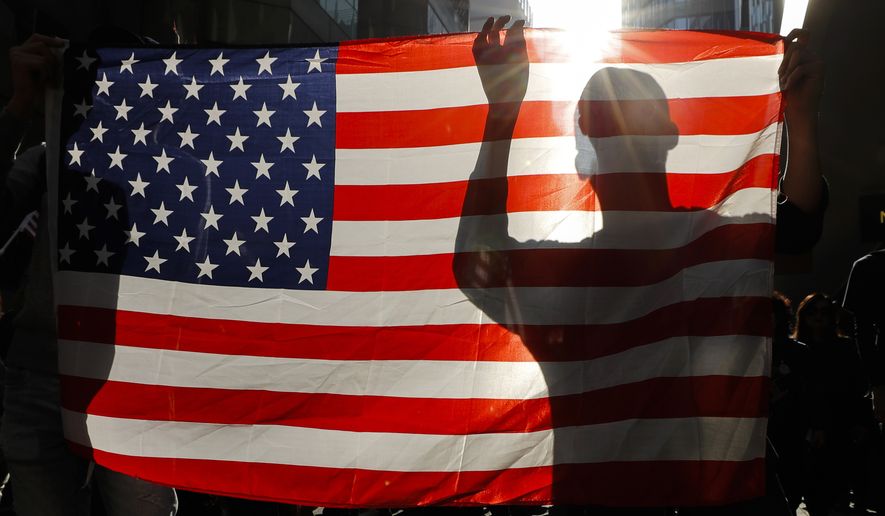A senior State Department official said Monday a new U.S. law will help preserve Hong Kong’s autonomy, even as Beijing announced a series of sanctions in response.
David Stillwell, the department’s most senior Asian policymaker, said in a speech that the Trump administration’s new policy seeks to promote pluralistic governance in the face of growing authoritarianism and hegemony in Asia and elsewhere.
Mr. Stillwell defended the passage last week of the Hong Kong Human Rights and Democracy Act that mandates lifting Hong Kong’s favorable trade status if its autonomy from mainland China is found to be undermined. The law also allows the U.S. government to sanction Chinese and other officials who undermine Hong Kong autonomy, and sparked expressions of pro-American sentiment among the city’s democracy protesters.
In response, China’s government announced Monday it is banning Navy ship visits to Hong Kong, and placing new curbs on the activities of several U.S. private rights groups.
Foreign Ministry spokeswoman Hua Chunying said called the U.S. law was a “serious interference in China’s internal affairs.”
“In response to the unreasonable U.S. practice, the Chinese government decides to suspend reviewing requests of U.S. military vessels and aircraft to visit Hong Kong starting from today and to impose sanctions on NGOs that played an egregious role in the Hong Kong amendment bill disturbance.
The American groups sanctioned include the federally funded National Endowment for Democracy, the National Democratic Institute for International Affairs, the International Republican Institute, Human Rights Watch and Freedom House.
Freedom House President Michael J. Abramowitz on Monday called the Chinese sanctions “odious,” saying in a statement, “The Chinese Communist Party’s most recent actions will only strengthen our resolve as we continue to oppose its well-documented efforts to undermine fundamental human rights.”
Increased U.S.-China tensions over Hong Kong come as the Trump administration is seeking to conclude a partial trade deal by the end of the year. A U.S. official said the United States has set a deadline of Dec. 15 for concluding a trade pact before even higher tariffs on Chinese goods are imposed.
Mr. Stillwell said the U.S. law is designed to protect the “one country, two systems” promise Beijing made when Hong Kong was handed over from the British in 1997.
If Hong Kong’s autonomy is infringed, the law allows the United States “to take certain actions that will affect the ability as a trading zone other things,” he added.
Mr. Stillwell, assistant secretary of state for East Asian and Pacific Affairs, emphasized the United States wants an end to the violence in Hong Kong.
Hong Kong protests broke out months ago over plans to impose a law that would permit the extradition to China of persons for prosecution where courts are controlled Communist government in Beijing. Following mass demonstrations, some marked by violence clashes with the police, protesters are now demanding much broader democratic reforms and free elections.
Recent elections saw pro-Beijing candidates losing.
Mr. Stillwell, in a speech, said the Trump administration’s new, tougher policy toward Beijing was the result of a past policies of conciliation that failed to bring about political reforms to match China’s economic reforms. He cited the troubling trends of American institutions, including the National Basketball Association, submitting to China’s pressure to conform to its policies, both domestically and internationally.
The Foreign Ministry’s Ms. Hua repeated Chinese government charges that the United States was secretly backing the pro-democracy protests.
“A large amount of facts and evidence have shown that these NGOs have supported anti-China plotters who messed up Hong Kong through various means, aiding and abetting them in extreme violent criminal acts and inciting ’Hong Kong independence’ separatist activities,” she said.
White House National Security Adviser Robert C. O’Brien, in a recent interview with The Washington Times, rejected the Chinese charges of U.S. meddling, calling them the “classic trope for oppressive governments all over the world.”
China in the past has used blocking Navy port calls in Hong Kong to send political signals. In one case, an aircraft carrier visit was called off at the last minute, stranding relatives of sailors in Hong Kong.
Pentagon spokesman Army Lt. Col. David Eastburn said the new law reflected “growing concern” in the U.S. over the events in Hong Kong.
“Port visits to Hong Kong and elsewhere around the region and the world have served as a useful program to provide liberty for our sailors and expand people to people ties with our hosts,” he said.
• Bill Gertz can be reached at bgertz@washingtontimes.com.




Please read our comment policy before commenting.